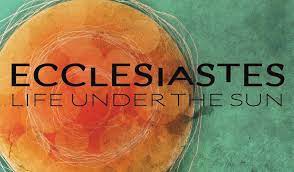The Message of Ecclesiastes

Ecclesiastes is not primarily meant to be a series of sermons, but rather a book that calls on you to engage with the Teacher (to see link click Ac – The Life of Solomon from a Messianic Jewish Perspective: Ecclesiastes – Author) and his journey and to enter into the dialogue he arouses within you. Thus, any attempt to summarize his message is in real danger of the “heresy of the paraphrase.” Solomon’s message unfolds, and needs to unfold, as the journey develops. As a result, the readers of this commentary are encouraged to work closely with the text of Ecclesiastes, to feel the agony of the Teacher’s journey, and to return to this book again at the end of the journey with him. The Teacher articulates his quest in terms of the meaningfulness of labor (1:3a); so that in one sense, Ecclesiastes is a book about work. However, this question backs him into the deeper question of the meaning of life under the sun (1:3b). As his journey unfolds, the still deeper question surfaces of how to explore such a question wisely.

There have been many proposals for the to translation of the Hebrew word hevel, ranging from absurd, meaningless, useless, and vanity. But for this commentary I will be using the word pointless because all of our labor under the sun (1:3) is pointless. We can find no meaning or satisfaction in earthly things. Money, sex, power, achievement – none of these things satisfy – only God does. This does not mean that if we believe in God, we stop feeling the frustrations of life under the sun. We do feel it. But Ecclesiastes shows our need for an “above the sun” perspective that brings joy and meaning to life. Thankfully there is a God who lives above the sun. As a result, we are not limited to the terrestrial; we can also get outside our own solar system and see things from a celestial perspective.20
Ecclesiastes thus encourages those of us struggling with the nature of life’s meaning and God’s purposes to pursue genuine wisdom by allowing our thinking to be shaped by a recognition that ADONAI is the Creator so we can enjoy His good gifts amid the paradox of His purposes for us. Because of God’s sovereignty over our lives and the events in which we live, despite that sometimes the purpose of our lives seems to us to be bewildering as a result of frequent the many troubles and tragedies we encounter, ADONAI does have a purpose for us beyond any immediate and apparent futility. Thus, Ecclesiastes is an encouragement for us to be truly wise in difficult and confusing situations.21
The seventeenth-century poet and preacher John Donne discovered that Ecclesiastes spoke to him as a sinful man living in the world. This was partly because Solomon didn’t hide any of his sins and poured out his own soul for everyone to see. By being honest about life’s troubles, Ecclesiastes touches the hearts of people who are struggling. It also has a way of speaking to the issues of the day . . . any day.
As much as anything else, Ecclesiastes is for the person who has their doubts about God but can’t stop thinking about Him. Maybe this is why Herman Melville – the famous author of Moby Dick – returned to Ecclesiastes again and again. One literary critic compared Melville to “the last guest who cannot leave the party because he was always returning to see if he had left his hat and gloves.” Solomon had his doubts also, and they enabled him to speak to skeptics as well as believers down through the centuries.
One thing Ecclesiastes doesn’t try to do is give all the answers. Some authors admit their limitations. Back in the eighteenth century, Dr Samuel Johnson wrote a monumental dictionary. When he was finished with his lexical masterpiece, the prodigious Dr Johnson had a definition for nearly every word in the English language. However, not for a moment did he think that he knew all the answers. In the preface to his dictionary, he echoed Ecclesiastes, “I saw that one question only gave rise to another, Ecclesiastes revealed the fact that to search is not always to find, and to find is not always to be informed; and that therefore, to pursue perfection was . . . like chasing after the wind (1:14).
Solomon found that looking for the meaning of life was like chasing the wind. This desperate image helps us understand Ecclesiasties. It is not the kind of book that we keep reading until we get to the end and find the answer. It continues to be mysterious. It’s a book in which we keep struggling with the problems of life and, as we struggle, we learn to trust God with the with the questions, even when we don’t have all the answers.22
But if some believe that everything is dying, that there is no meaning to anything and nothing matters under the sun, for God will bring to judgment everything we do, including every secret, whether good or bad (Eccs 12:14). He was not talking about eternal judgment because life after death was as mysterious to him (11:8) as the unequal distribution distribution of justice. His emphasis was on this life under the sun, and its opportunities for service (9:10 and 12:17) and enjoyment (2:24-26, 3:12 and 22, 5:18-20, 8:15, 9:7-9). He thought life after death offered no such opportunities. Therefore, he didn’t comment on any differences after death between the righteous of the TaNaKh and the wicked, the wise and the foolish, man or beast.23



Leave A Comment